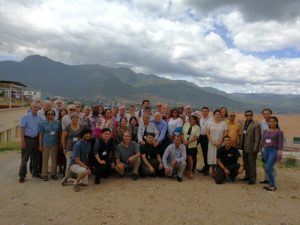May 6 2008 — Madrid – Asia’s vulnerable communities and environment will continue to be at risk if the Asian Development Bank fails to improve its existing Safeguards that are currently being revised… …Further, the ADB Safeguard policies on the environment, involuntary resettlement and indigenous peoples should protect the poor and not corporate interests.Thus warned civil society organizations from Asia, Europe and the United States during a panel discussion on the Safeguards that was attended by representatives from ADB management and Board.Ted Downing, President of the International Network on Displacement and Resettlement, said communities that were displaced because of Bank-financed projects would be impoverished without rigorous provisions on resettlement thereby undermining the ADB’s goal of poverty reduction. “We need to be aware of what will happen to the unknown and unborn who will be displaced by ADB projects without adequate safeguard policies in place,” he said. …Further, the ADB Safeguard policies on the environment, involuntary resettlement and indigenous peoples should protect the poor and not corporate interests.Thus warned civil society organizations from Asia, Europe and the United States during a panel discussion on the Safeguards that was attended by representatives from ADB management and Board.Ted Downing, President of the International Network on Displacement and Resettlement, said communities that were displaced because of Bank-financed projects would be impoverished without rigorous provisions on resettlement thereby undermining the ADB’s goal of poverty reduction. “We need to be aware of what will happen to the unknown and unborn who will be displaced by ADB projects without adequate safeguard policies in place,” he said.
Th e Safeguards panel comes at a critical point in the ongoing Safeguards review process that the Bank initiated in 2005. CSOs have criticized the draft safeguard policy statement (SPS), released in 2007 which became the basis for a series of multi-stakeholder regional consultations, as generally weak and regressive. Recently, the Bank announced that a second draft of the SPS will be released for public comment and consultation.Titi Soentoro from the Indonesian watchdog organization Nadi explained that development meant different things depending on different perspectives. She said, “The ADB and donor countries might think they are doing a service to developing countries. However, development goes beyond economic indicators and includes protection of livelihoods and an intact environment. These could not be achieved without strong Safeguard policies in place.” e Safeguards panel comes at a critical point in the ongoing Safeguards review process that the Bank initiated in 2005. CSOs have criticized the draft safeguard policy statement (SPS), released in 2007 which became the basis for a series of multi-stakeholder regional consultations, as generally weak and regressive. Recently, the Bank announced that a second draft of the SPS will be released for public comment and consultation.Titi Soentoro from the Indonesian watchdog organization Nadi explained that development meant different things depending on different perspectives. She said, “The ADB and donor countries might think they are doing a service to developing countries. However, development goes beyond economic indicators and includes protection of livelihoods and an intact environment. These could not be achieved without strong Safeguard policies in place.”
Stephanie Fried from the Environmental Defense Fund called for the Bank to disclose and consult on the TOR for the next steps in the Safeguard review process. The second policy statement should be accompanied by a draft Operations Manual and its resource implications. Fried challenged the Bank to pursue “upward harmonization with best international practices, not a “race to the bottom.”
Referring to the current food crisis, Joanna Levitt of the International Accountability Project observed that in many cases, ADB projects which promote industrial development have resulted in the destruction of livelihood sources, undermining the food sovereignty of affected communities.
 On the other hand, Nessim Ahmad, head of ADB’s Environmental and Social Safeguard Department, rejected civil society’s contention that the existing Safeguard policies have been weakened by the current consultation draft. He said the many submissions made during the regional consultations included areas of agreement between the Bank and NGOs. However, he mentioned that there are still areas where the policy statement would need more work and key policy challenges, such as “free prior informed consent”, on which the Bank must seek more dialogue. On the other hand, Nessim Ahmad, head of ADB’s Environmental and Social Safeguard Department, rejected civil society’s contention that the existing Safeguard policies have been weakened by the current consultation draft. He said the many submissions made during the regional consultations included areas of agreement between the Bank and NGOs. However, he mentioned that there are still areas where the policy statement would need more work and key policy challenges, such as “free prior informed consent”, on which the Bank must seek more dialogue.
|





